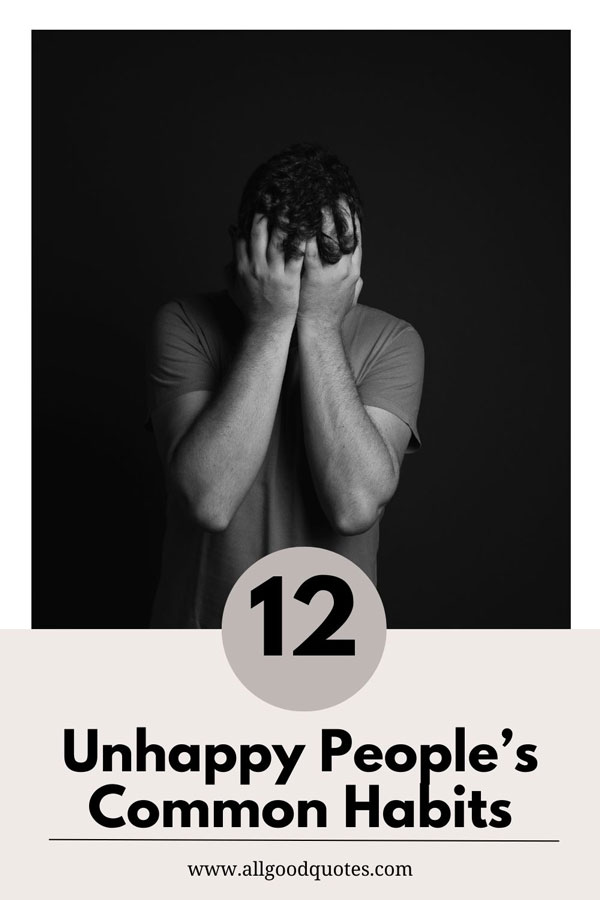Unhappy people’s common habits are negative thinking patterns that we are focusing in this post.
While most people claim to desire to be happy, many people unintentionally engage in self-defeating behaviors that contribute to low moods and a negative outlook. The good news is that top psychologists estimate that we have the ability to change up to half of our human potential for happiness.
“There is no path to happiness; happiness is the path.”
Gautam Buddha
Here are the most prevalent 12 Unhappy People’s Common Habits
1. Assuming that things will always be difficult
While expecting everything you want will fall into your lap will leave you disappointed, assuming life will be difficult will also leave you unsatisfied. The latter viewpoint is frequently accompanied by feelings of helplessness and victimization. Instead, recognize that life will be difficult at times, but work to stay motivated to engage in the type of active problem-solving that leads to success.
2. Comparisons are constantly made
Unhappy people are often jealous and resentful of others’ achievements, believing that they are unjustified. They may be continually comparing themselves to others and feeling depressed because they may not have as much money or a “excellent” career as their neighbor. Constantly comparing one’s life to that of others is a harmful habit. Allowing other people’s achievements to inspire and uplift you, viewing them as reassuring reminders of what is possible, is a better method.

3. Desire for Perfection
Happiness will be difficult to come by. Even if you have a lot of outstanding or excellent accomplishments, setting the bar for your performance at an inhuman level frequently leads to low self-esteem and the sensation that you are not good enough. Except maybe once in a while when something seems to go perfectly, you and what you do are never good enough.
4. Control-hunger
It is to realize you’re not a helpless victim of circumstance. However, be cautious not to go too far and develop another harmful habit on the opposite end of the range: a need for constant control. You’ll be happier if you take steps to achieve your objectives. Accepting that failures and unexpected changes in plans are inevitable. It encourages you to develop the abilities required to adapt and continue in the face of adversity.
5. Refusing to believe
Not everyone is on your side or trustworthy. The basic assumption that people are trustworthy until proven otherwise, on the other hand, leads to stronger bonds and a more optimistic attitude. Unhappy people tend to assume that everyone is out to get them, which leads to emotions of tension, anxiety, and isolation.
6. Uncertainty about the future
Another aspect of the sad person’s tendency for focusing on the negative is to entertain horrifying fantasies about what could go wrong. Even if you realize that life can place an obstacle in the works, it is more healthier to consider how things could end out. While it is unrealistic to expect cheerful people to never be anxious or scared about the future, they do have a better understanding of how to cope with these difficult emotions.
7. Focus On Negative Memories
Negative memories are linked to feelings of frustration, and when you’re unhappy, you’re more prone to spend time on the negative memories. Which resulting in a destructive feedback loop. Focusing on the negative elements of any situation is an easy way to make yourself unhappy.
Also Read: 10 Golden Words for Life
8. Lack of physical activity
People who exercise at least a few times a week (even if it’s simply walking around a lovely green place) are continuously happier than those who stay restricted to their favorite cosy chair, according to studies. Raising your heart rate will, at the very least, increase endorphin production and put you in a better mood.
9. They Place Blame on Others
If you’re always unhappy, you’ll start blaming others for your misery. You’ll be tempted to play the victim and point the finger at everyone but yourself. You will be unaware that you are in charge of your own destiny. You are alone responsible for your own actions and responses to life’s problems.
Instead, acknowledge that you are in command, even if it doesn’t feel like it. Recognize that if you truly want to, you can change things for the better. After all, happiness is believed to be an interior state.
10. They choose fights with other people
Your grief can exacerbate negative emotions such as fury, envy, despair, frustration, guilt, and so on. These emotions can then influence how you interact with others. This has the potential to be far more damaging than one may think.
It has the potential to ruin relationships and make you feel much worse. If this is the case, you must make modifications as soon as possible. The first thing I would recommend is that you start meditating. It will immediately assist you in achieving a lot better mental state.
11. They Quit Too Often
We all understand that if we want to be successful. We must keep working hard. Even when things are difficult, we must continue. Unhappy people tend to give up too easily.
They lack a sense of determination. Therfore, this increases their frustration.
You will never reach your goals if you keep giving up. If you do not achieve your goals, you will be dissatisfied for the rest of your life.
12. Life is overly complicated
Life can be very complicated. This may cause tension and frustration. Yes, the world is becoming more complicated, but that doesn’t mean we can’t adopt new habits to make our lives easier.
10 quotes from famous writers
Here are 10 quotes from famous writers on the common habits and thoughts of unhappy people:
“We are all in the gutter, but some of us are looking at the stars.”
Oscar Wilde
Unhappy people focus on the negativity around them.
“The greater part of our happiness or misery depends upon our dispositions, and not upon our circumstances.”
Martha Washington
Unhappy people make their mood to be as per external events.
“What we see depends mainly on what we look for.”
John Lubbock
Unhappy people tend to focus on the negative.
“It is not in the stars to hold our destiny but in ourselves.”
William Shakespeare
Unhappy people often feel helpless.
“People are just as happy as they make up their minds to be.”
Abraham Lincoln
Unhappy people often overlook that happiness is a choice.
“Comparison is the thief of joy.”
Theodore Roosevelt
Unhappy people frequently compare themselves to others, that lead to frustration.
“The mind is its own place, and in itself can make a heaven of hell, a hell of heaven.”
John Milton
Unhappy people create misery through negative thoughts.
“Most folks are about as happy as they allow themselves to be.”
Mark Twain
Unhappy people often limit their own happiness through their negative mindset.
“Happiness depends upon ourselves.”
Aristotle
Unhappy people mistakenly think external things will bring them happiness.
“There is no greater sorrow than to recall happiness in times of misery.”
Dante Alighieri
Unhappy people live in the past, which lead to their sadness.
Final Line
Once you recognize these behaviors and seek to break free from them, the cycle of sadness may be broken. If you’re having problems doing so, consider seeking assistance from a therapist.

